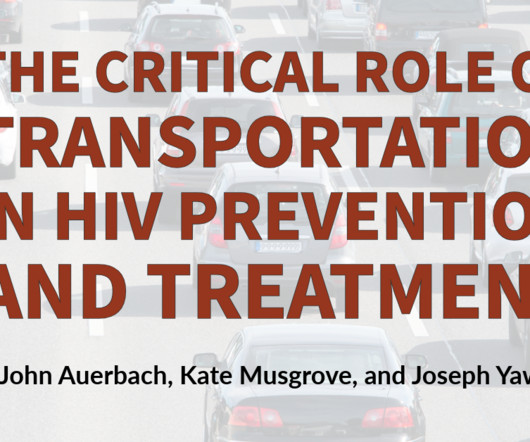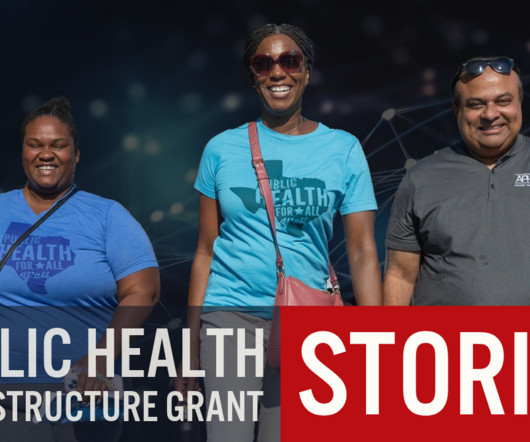Researchers discover building blocks that could 'revolutionize computing'
Science Daily: Pharmacology News
SEPTEMBER 12, 2024
A research team has made a major discovery by designing molecules that could revolutionize computing.

Science Daily: Pharmacology News
SEPTEMBER 12, 2024
A research team has made a major discovery by designing molecules that could revolutionize computing.

Smart Data Collective
SEPTEMBER 12, 2024
Big data technology has significantly changed the healthcare sector over the last few years and will continue to impact it for years to come.
This site is protected by reCAPTCHA and the Google Privacy Policy and Terms of Service apply.

Science Daily: Pharmacology News
SEPTEMBER 12, 2024
Our planet will only remain able to provide even the most basic standard of living for everyone in the future if economic systems and technologies are dramatically transformed and critical resources are more fairly used, managed and shared, a new report shows.

JPHMP Direct
SEPTEMBER 12, 2024
As policy makers and HIV activists continue to focus on the optimal ways to stem the pandemic, it would be wise to pay attention to transportation and other social and economic factors that affect HIV prevention and treatment. The post The Critical Role of Transportation in HIV Prevention and Treatment first appeared on JPHMP Direct.

Science Daily: Pharmacology News
SEPTEMBER 12, 2024
A landslide in a remote part of Greenland caused a 200 meter (650 foot) mega-tsunami that sloshed back and forth across a fjord for nine days, generating vibrations throughout Earth, according to a new study. The study concluded that this movement of water was the cause of a mysterious, global seismic signal that lasted for nine days and puzzled seismologists in September 2023.

Science Daily - Public Health
SEPTEMBER 12, 2024
In a series of focus groups conducted in different areas of the United States, doctors and patients expressed openness to considering environmental factors when discussing treatment options. The findings suggest that educating physicians about the environmental costs of treatment -- and how those costs may be reduced while continuing to deliver excellent care -- can be a first step toward that goal.
Public Health Engage brings together the best content for public health professionals from the widest variety of industry thought leaders.

Big Cities Health Coalition
SEPTEMBER 12, 2024
In collaboration with BCHC, Drexel’s Urban Health Collaborative analyzed pay structures in 11 large urban health departments to understand workforce needs and challenges. Despite some difficulties comparing across departments, the study reveals trends that can inform future improvements in pay, benefits, and competitive hiring practices. Guest post by Allison Gibson and Jennifer Kolker , Drexel Urban Health Collaborative Governmental public health departments can only meet the needs of the

Science Daily: Pharmacology News
SEPTEMBER 12, 2024
Researchers can harvest protein and vitamin B9 from microbes by feeding them nothing much more than hydrogen, oxygen, and CO2. The technology runs on renewable energy to produce a sustainable, micronutrient-enriched protein alternative that may one day make it to our plates.

The NACCHO Podcast Series
SEPTEMBER 12, 2024
Washington, DC, September 12, 2024 — On this special podcast episode, the National Association of County and City Health Officials ’ (NACCHO) Director of Government Affairs, Victoria Van de Vate, welcomes special guest Eric McNulty , Associate Director of the National Preparedness Leadership Initiative at Harvard University, for a bonus episode on best practices to implement for effective preparedness work on the local level.

Science Daily: Pharmacology News
SEPTEMBER 12, 2024
Could invisibility cloaks become a reality? New research brings this science fiction concept a step closer, with a breakthrough software package that simulates how waves interact with complex materials.

HEALTHBEAT
SEPTEMBER 12, 2024
Andrew Douglass shoved his clothes and belongings into plastic trash bags as five police officers surrounded his encampment — a drab gray tent overflowing along a bustling sidewalk in the gritty Tenderloin neighborhood, where homeless people lie sprawled on public sidewalks, sometimes in drug overdoses. Officers gave him a choice: Go to a shelter or get arrested and cited for sleeping outside.

Science Daily: Pharmacology News
SEPTEMBER 12, 2024
Researchers have been able to initiate a controlled movement in the very heart of an atom. They caused the atomic nucleus to interact with one of the electrons in the outermost shells of the atom. This electron could be manipulated and read out through the needle of a scanning tunneling microscope. The research offers prospects for storing quantum information inside the nucleus, where it is safe from external disturbances.

Managed Care Matters
SEPTEMBER 12, 2024
During the Presidential debate former President Trump stated the Democratic Party supports “post-birth abortion.” The back story Thanks for reading Managed Care Matters! Subscribe for free to receive new posts and support my work. The genesis of this assertion appears to be a statement by Virginia’s then-Governor Ralph Northam, M.D.

Science Daily: Pharmacology News
SEPTEMBER 12, 2024
A sweeping global research review of the links between climate and agriculture reveals the likelihood of an emergent feedback loop whereby, as climate change puts more pressure on the global food supply, agriculture will, by necessity, adopt practices that may exacerbate its environmental impact. The paper also identifies new agricultural practices that have the potential to increase efficiency and stabilize our food supply in the decades to come.

Science Daily: Pharmacology News
SEPTEMBER 12, 2024
Landmark new research shows Ice Age teens from 25,000 years ago went through similar puberty stages as modern-day adolescents.

Science Daily: Pharmacology News
SEPTEMBER 12, 2024
Researchers have shown unprecedented control of SIV replication and decay of viral reservoirs by combining a stringent model of infection with the interruption of antiretroviral therapy (ART). The success of this immune-based approach follows the research team's identification of the mechanisms of action for PD1 and IL-10, molecules known to regulate HIV persistence and immune dysfunction.

Science Daily: Pharmacology News
SEPTEMBER 12, 2024
Extreme conditions prevail inside stars and planets. The pressure reaches millions of bars, and it can be several million degrees hot. Sophisticated methods make it possible to create such states of matter in the laboratory -- albeit only for the blink of an eye and in a tiny volume. So far, this has required the world's most powerful lasers, and the opportunities for experiments are correspondingly rare.

Science Daily: Pharmacology News
SEPTEMBER 12, 2024
A new study finds that a trilobite species with exceptionally well-preserved fossils from upstate New York has an additional set of legs underneath its head. The research suggests that having a fifth pair of head appendages might be more widespread among trilobites than once thought and helps researchers better understand how trilobite heads are segmented.

Science Daily: Pharmacology News
SEPTEMBER 12, 2024
Researchers have discovered why lithium-ion batteries, which power most electronic devices, lose capacity overtime. The findings could enable the development of electric vehicles that go far longer without needing a charge.

Science Daily: Pharmacology News
SEPTEMBER 12, 2024
Astronomers have directed NASA's James Webb Space Telescope to examine the outskirts of our Milky Way galaxy. Scientists call this region the Extreme Outer Galaxy due to its location more than 58,000 light-years away from the Galactic Center. (For comparison, Earth is approximately 26,000 light-years from the center.

Science Daily: Pharmacology News
SEPTEMBER 12, 2024
The movement of carbon dioxide (CO2) from the surface of the ocean, where it is in active contact with the atmosphere, to the deep ocean, where it can be sequestered away for decades, centuries, or longer, depends on a number of seemingly small processes. A key microscale process in the ocean is the dietary preferences of bacteria that feed on organic molecules called lipids.

Science Daily: Pharmacology News
SEPTEMBER 12, 2024
Of the first five U.S. states to implement food waste bans, only Massachusetts was successful at diverting waste away from landfills and incinerators, according to a new study.

Science Daily: Pharmacology News
SEPTEMBER 12, 2024
Climate change and asteroids are linked with animal origin and extinction -- and plate tectonics also seems to play a key evolutionary role, 'groundbreaking' new fossil research reveals. The discovery of an exceptionally well preserved ancient primitive Devonian coelacanth fish in remote Western Australia has been linked to a period of heightened tectonic activity, or movement in the Earth's crust, according to the new study.

Science Daily: Pharmacology News
SEPTEMBER 12, 2024
A new study by more than 50 climate scientists worldwide provides the clearest projection that Antarctica's ice sheet will retreat rapidly after 2100 under current carbon emissions, with global sea levels rising by as much as 5.5 feet by 2200. The study combined 16 climate models and found that ice loss will gradually increase through this century until the ice sheet becomes highly unstable, possibly experiencing a near-total collapse by 2300.

Science Daily: Pharmacology News
SEPTEMBER 12, 2024
Without immediate action, humanity will potentially face further escalation in resistance in fungal disease, a group of scientists from the around the world has warned. According to the scientists most fungal pathogens identified by the World Health Organization -- accounting for around 3.8 million deaths a year -- are either already resistant or rapidly acquiring resistance to antifungal drugs.

Science Daily: Pharmacology News
SEPTEMBER 12, 2024
Hundreds of gamma-ray bursts (GRBs) have been recorded as part of an enormous global effort so extensive it 'rivals the catalog of deep-sky objects created by Messier 250 years ago', astronomers say. GRBs are the most violent explosions in the Universe, releasing more energy than the Sun would in 10 billion years. They occur when either a massive star dies or two neutron stars merge.
Let's personalize your content